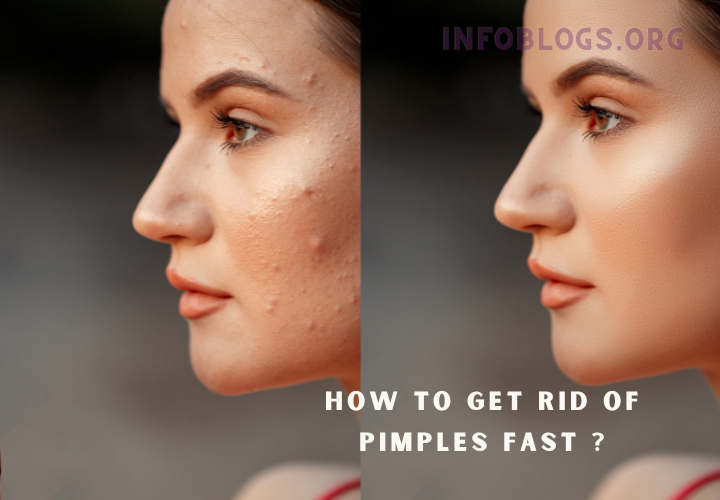In today's article we will study pimples and learn how to get rid of pimples fast.
Pimples are one of the most common skin conditions, causing inflammation and redness for people of all ages. They can range from small bumps on the surface of the skin to large cysts that can cause pain and discomfort. Knowing what pimples are, how they form, and how to treat them is key to managing them effectively.
Pimples occur when a pore gets clogged with oil, dead skin cells, or bacteria. The resulting inflammation creates a bump on the surface of the skin that ranges in size from tiny whiteheads to large cysts filled with pus. Pimples typically appear on areas such as the face, chest, back and shoulders where there are more sebaceous glands producing oils and sweat.
Causes of Pimples
Pimples are a common skin condition that can affect anyone of any age. They are caused by a variety of factors, including hormones, stress, genetics, and certain medications. While most pimples go away on their own with natural treatments like acne-fighting skincare products and lifestyle changes, understanding the potential causes of pimples can help you better prevent them from occurring in the first place.
Hormonal fluctuations are often the main cause of pimples in teenagers and young adults. During this stage of life, hormone levels can fluctuate significantly due to puberty or other hormonal changes associated with menstruation or pregnancy. This sudden shift can lead to an increase in oil production on the skin's surface which then clogs pores and causes breakouts.
Types of Pimples
Pimples are an unfortunate part of growing up, but it's important to understand the different types of pimples in order to best address them. While some may look similar, each type of pimple has a unique cause and treatment. Here is everything you need to know about the different types of pimples.
Whiteheads are one type of common pimple which are caused by clogged pores that become filled with sebum and bacteria. They usually appear as small white bumps on the skin, and can often be treated with topical acne treatments such as benzoyl peroxide or salicylic acid. Blackheads, another type of common pimple, occur when a pore becomes clogged with too much oil, dirt and dead skin cells.
Treatment for Pimples
Pimples are a common skin issue among teenagers and adults alike. They can cause physical discomfort, as well as emotional distress due to their unsightly appearance. Fortunately, there are many ways to treat pimples and keep breakouts under control. This article will explore the different treatment options available for dealing with pimples from both over-the-counter products and professional treatments.
The most common type of treatment for mild pimple breakouts is topical creams, lotions, and gels that contain acne-fighting ingredients such as benzoyl peroxide or salicylic acid. These products help reduce inflammation, clear out clogged pores, and reduce the production of excess oil that can cause future breakouts. In more severe cases of acne, medical professionals may prescribe antibiotics or other medications to clear up existing blemishes while preventing new ones from forming.
Prevention for Pimples
Pimples are a common skin issue that affects people of all ages. But it's not something anyone has to live with. There are simple steps you can take to prevent pimples from appearing on your skin in the first place. From using gentle cleansers to avoiding certain types of makeup, here is what you need to know about preventing pimples.
One way to prevent pimples is by using a gentle facial cleanser twice daily. This helps keep dirt, oils and other impurities away from your skin, which can trigger acne breakouts. Additionally, opt for oil-free products that don’t clog pores and look for ones that contain salicylic acid or benzoyl peroxide as these ingredients can help reduce bacteria and inflammation on the surface of your skin.
Home Remedies for Pimples
Home Remedies for Pimples can be a great way to help get rid of your skin woes without spending money on expensive products. We’re going to give you some tips and tricks that can help you banish those pesky pimples in no time! From natural ingredients like honey and lemon, to herbal remedies like lavender oil, these home remedies for pimples are all-natural, gentle and easy to use. With just a few simple steps, you’ll be able to quickly reduce the redness, inflammation, and size of the pimple while nourishing your skin with healthy ingredients. If you’re looking for an effective way to treat acne without harsh chemicals or toxins, then these home remedies are definitely worth trying out!
Simply apply ice directly to the pimple. This can help minimize inflammation and redness while helping dry out the area so that bacteria doesn’t spread further. To use this method effectively, wrap an ice cube in a clean cloth or tissue and apply it directly onto the affected area for about 10 minutes at a time.
An age-old beauty treatment for pimples, the application of a paste made from crushed aspirin, is still used today. Aspirin contains salicylic acid which helps to remove dead skin cells, reduce inflammation, and unclog pores. This simple solution can be an effective way to treat stubborn blemishes and acne.
To apply the paste to the pimple, take one aspirin tablet and crush it into a powder using a mortar and pestle or the back of a spoon. Dilute this powder in a few drops of water until it forms a thick paste. Apply this paste directly onto the affected area and allow it sit for 10 minutes before rinsing off with cool water. To maximize results use this method several times per week as needed until the pimple has disappeared completely.
Over-the-Counter Acne Spot Treatment.
Other medications for Acne.
Acne is an issue that affects many people, young and old. Those seeking relief from acne breakouts may find over-the-counter acne spot treatments to be a helpful tool in managing their skin issues. The ingredients in these products can range from benzoyl peroxide to tea tree oil and are intended to reduce redness, inflammation, and visible signs of acne.
These treatments come in a variety of forms such as gels, creams, sprays and lotions. Depending on the product's formulation and strength, some may be more effective than others for certain types of acne. In addition to treating existing blemishes or breakouts, users may find that using an OTC spot treatment helps with preventing future flare ups due to its' antibacterial properties which also help clear clogged pores.
Get a Cortisone Injection to Quickly Get Rid of a Pimple
Do you have a stubborn pimple that won't go away? You can get rid of it quickly and easily with a cortisone injection. A cortisone injection is a safe, non-invasive procedure used to reduce the inflammation associated with acne lesions. It works by decreasing the inflammatory response that causes redness and swelling associated with pimples. The most common areas for injections are on the cheeks, forehead and chin.
The procedure is relatively simple and takes just minutes to perform. Your doctor will inject a small amount of steroid medication directly into your skin near the affected area. The steroid works by reducing inflammation and calming down any irritation caused by the pimple itself. In some cases, additional treatments may be necessary if your acne does not respond well to just one injection.
Conclusion: Ways to Manage Pimples
Pimples can be an annoying part of life, but they don't have to be unmanageable. Fortunately, there are a number of ways to reduce the frequency and severity of pimples. The key is to use a combination of strategies that work best for your skin type and lifestyle. Here are some tips for managing pimples:
Cleanse twice daily with lukewarm water and gentle cleansers that won't strip away natural oils in the skin or aggravate existing breakouts. Avoid touching your face as much as possible, since this can spread bacteria from your hands onto your skin. Use oil-free sunscreens when outdoors and make sure you always remove makeup before going to bed. Additionally, eating a balanced diet with plenty of fruits and vegetables is important for overall skin health as well as avoiding processed junk food which may cause inflammation in the body.


